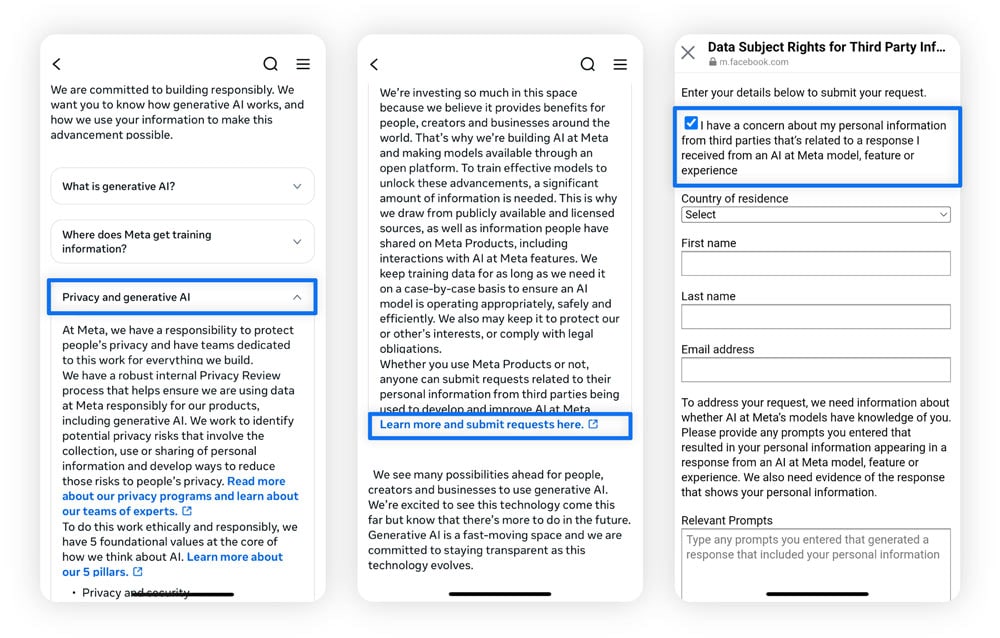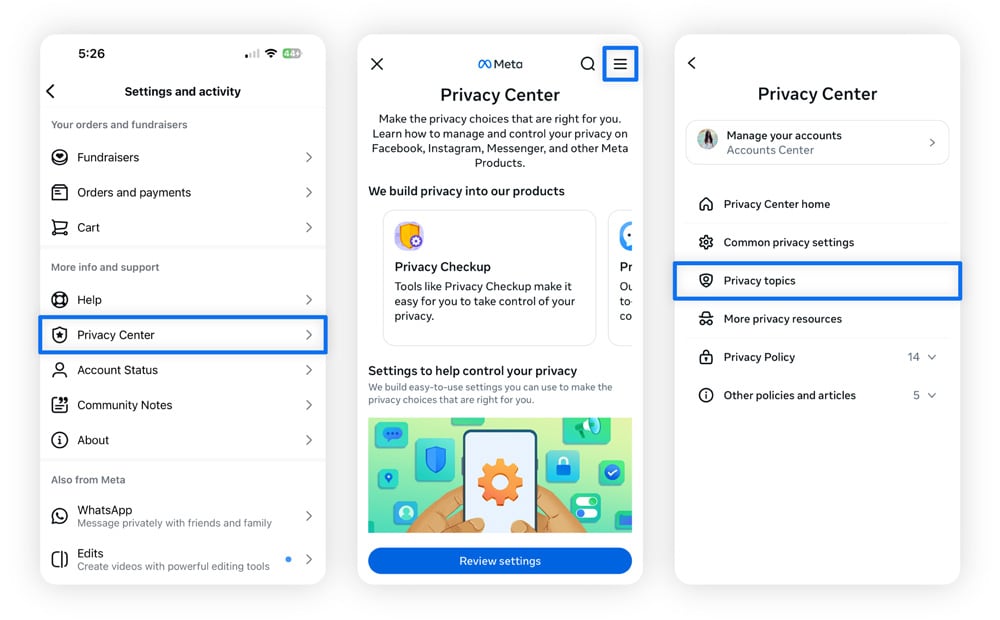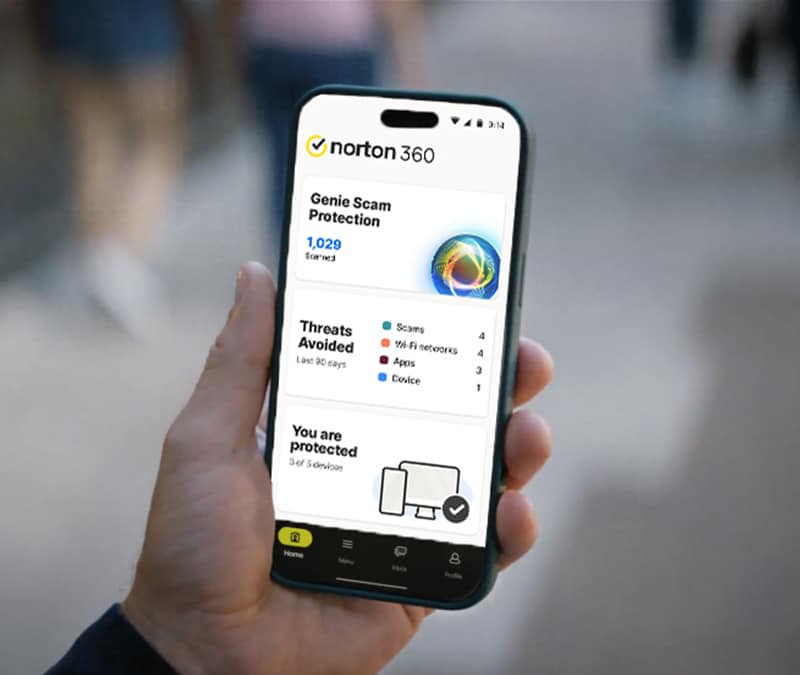How to opt out of Meta AI: Options to protect your data
Meta AI collects your public and chatbot data across Facebook, Instagram, and WhatsApp to train its AI models, sparking privacy concerns for some users. Find out what you can do to limit Meta AI’s access to your data, and how Norton AntiTrack can help you stay more private online.

If you use Facebook, Instagram, or WhatsApp, you’ve probably seen Meta AI pop up in your chats, search bar, or feed. It’s a built-in chatbot that helps with things like editing videos or answering questions. You’ll recognize its blue-and-purple swirl, usually in the bottom corner of WhatsApp or inside the search bar on Facebook and Instagram.
While some users appreciate the convenience it offers, others are concerned about what this AI feature means for their privacy, and for good reason. As AI tools burn through publicly available data, Meta found a solution — using your interactions with its AI bot and public posts to help train its generative AI tools.
Thanks to strong data privacy laws, users in the European Union were given the option to opt out. However, Meta didn’t offer American users a similar choice.
While there’s currently no simple way to opt out or turn Meta AI off wherever you live, we’ll walk you through a few steps you can take to better protect your data and regain some control over what you share.
How to turn off Meta AI on Facebook
There’s no automatic opt‑out button for Meta AI, but you can submit an objection requesting that Meta doesn’t use your data from third parties for AI training.
The process for objecting is fairly complicated, requiring you to fill out a form with proof that a Meta AI tool included your personal information, like your name, address, email, or phone number, in one of its responses.
If you have evidence that your personal details have already appeared in Meta AI output, report it via the Facebook app:
- Open the Facebook app and tap Menu in the bottom right corner on iPhone (top right on Android).
- Scroll down and tap Settings & Privacy, and then Privacy Center.
- Tap Menu in the top right corner of your screen and then Privacy topics.
- Scroll to AI at Meta and tap Get Started.
- Tap Review all resources, then More detailed information about Meta’s generative AI models.
- Tap the arrow dropdown next to Privacy and generative AI.
- Scroll down and tap Learn more and submit requests here.
- Check the box next to “I have a concern about my personal information from third parties that's related to a response I received from an AI at Meta model, feature, or experience.”
- Complete the form with your details, relevant prompts, an explanation of your concern, and screenshots.
- Tap Send to submit your request.


If Meta denies your request, the only guaranteed way to protect your information from being used for AI training is to delete your Facebook account. It's a tough call, but it's currently the most effective option for users who prioritize data privacy.
It’s also worth noting that Meta states it does not use content from private posts, so if you never post publicly, your data shouldn’t be included in AI training.
How to turn off Meta AI on Instagram
Instagram users can follow similar steps to submit an objection request through the app. Like Facebook, Instagram directs you to Meta’s Privacy Center to complete the process.
If your Instagram and Facebook accounts are linked, you only need to submit the request once, since it applies to both.
Follow these steps to submit an objection request through Instagram:
- Open the Instagram app and tap Menu in the top right corner of the Profile tab.
- Scroll down and tap Privacy Center. (Note that from here on, the steps are the same as Facebook.
- Tap Menu in the top right corner of your screen and then Privacy topics.
- Scroll to AI at Meta and tap Get Started.
- Tap Review all resources, then More detailed information about Meta’s generative AI models.
- Tap the arrow dropdown next to Privacy and generative AI.
- Scroll down and tap Learn more and submit requests here.
- Check the box next to “I have a concern about my personal information from third parties that's related to a response I received from an AI at Meta model, feature, or experience.”
- Complete the form with your details, relevant prompts, an explanation of your concern, and screenshots.
- Tap Send to submit your request.


Can you opt out of Meta AI on WhatsApp?
There’s no way to submit an objection request directly through WhatsApp. While there was previously a toggle to turn off AI features, Meta has since removed this option. Instead, you can simply avoid using Meta AI or mute the feature.
Meta states that your private WhatsApp chats are secure and won’t be used for training purposes. However, any conversations you have or share with Meta AI could be used for training purposes. So if you want to limit data collection, just don’t interact with the chatbot.
How to mute Meta AI
While you can’t fully turn off Meta AI across Facebook, Instagram, or WhatsApp, you can mute it. Keep in mind though, muting Meta AI won’t protect your privacy — it only stops notifications and messages.
Here’s how to mute Meta AI on each Meta app:
On Facebook:
- Open the Facebook app and tap the search icon in the top right corner.
- Type anything into the search bar, and tap the blue arrow to run the search.
- Tap the Meta AI logo that appears, then tap the information icon in the top right.
- Tap Mute, then choose “Until I change it.”
On Instagram:
- Open the Instagram app and tap the Message (speech bubble) icon in the top right.
- Tap inside the search bar, then tap the Meta AI logo.
- Tap the information icon in the top right, then tap Mute.
- Toggle on Mute messages and then choose “Until I change it.”
On WhatsApp:
- Open the WhatsApp app and tap the Meta AI logo in the bottom right.
- Type anything into the message bar and tap the green arrow to start a chat with Meta AI.
- Tap the Meta AI logo, scroll down to tap Mute, and then select Always. (If you don’t see the Mute option on the first screen, tap Notifications, then Mute.)
How Meta uses your data to train its AI
Meta needs massive amounts of data to train its AI systems, including publicly available information, licensed content, and user activity across its platforms. This data can include public posts, photos, captions, or anything you share with the chatbot.
While Meta says it doesn’t use private messages for training, anything else you post could be fair game for AI development. That’s sparked concerns about data security, especially if this information were ever exposed in a data breach or leak.
Since there’s no universal opt-out, many users feel this data collection is happening without their permission.
What about Facebook’s new camera roll cloud processing?
Facebook quietly released a new camera roll cloud processing feature, framing it as a creative tool to help you generate things like birthday collages or trip recaps using photos in your camera roll.
But enabling it comes with privacy trade-offs and potential cloud security risks. While Facebook told The Verge that it’s not “currently” training its AI on photos it can see with this new feature, it does give Meta access to view and analyze the photos on your phone, including ones you haven’t shared publicly.
And, at this stage, there’s little transparency about which photos get processed, meaning sensitive content like images of children or intimate moments could potentially get caught in the mix.
However, unlike Meta AI, this feature is currently optional, meaning Facebook can’t access your camera roll unless you give it permission. To activate it, you must agree to Meta’s AI terms, which allow the platform to analyze facial biometric features, among other conditions.
Help keep your online identity private
There’s no escaping AI — whether you’re on a Meta app or using a Google product, AI features are becoming more and more common. And, in this era of new AI-powered features, protecting your online privacy is more important than ever now.
Norton AntiTrack helps conceal your digital fingerprint, including details such as your device settings, browsing habits, and location — information companies use to track you, build a profile, and serve targeted content. It’s an easy way to regain more control of your online privacy, while websites work hard to learn all about you.
FAQs
What is Meta AI?
Meta AI is a chatbot Meta integrated into Facebook, Instagram, and WhatsApp. It’s designed to act as your virtual assistant in these apps, helping you create AI-generated images, edit videos, and get quick answers to your questions.
How does Meta AI work?
Meta AI uses Llama (Large Language Model Meta AI), a family of large language models similar to the GPT models that power OpenAI’s ChatGPT. Meta AI is designed to understand questions and generate responses in real time. Over time, it learns from users’ public interactions to provide them with relevant information and assistance.
Who owns Meta AI?
Meta Platforms, Inc., formerly known as Facebook, Inc., owns and operates Meta AI, and Mark Zuckerberg is CEO.
Is it too late to opt out of Meta AI?
Yes, the deadline for European users to opt out of Meta AI passed on May 27, 2025. And in the U.S., there was no opt-out option at all. At this point, your only choices are to submit an objection request or delete your Instagram, Facebook, WhatsApp, and other Meta accounts to prevent your public data from being used for AI training.
How do I get rid of Meta AI on Facebook and Instagram?
There’s no way to fully get rid of Meta AI on Facebook and Instagram, but you can mute the chatbot notifications, and choose not to interact with it.
Meta AI is owned by Meta Platforms, Inc.
Editorial note: Our articles provide educational information for you. Our offerings may not cover or protect against every type of crime, fraud, or threat we write about. Our goal is to increase awareness about Cyber Safety. Please review complete Terms during enrollment or setup. Remember that no one can prevent all identity theft or cybercrime, and that LifeLock does not monitor all transactions at all businesses. The Norton and LifeLock brands are part of Gen Digital Inc.








Want more?
Follow us for all the latest news, tips, and updates.